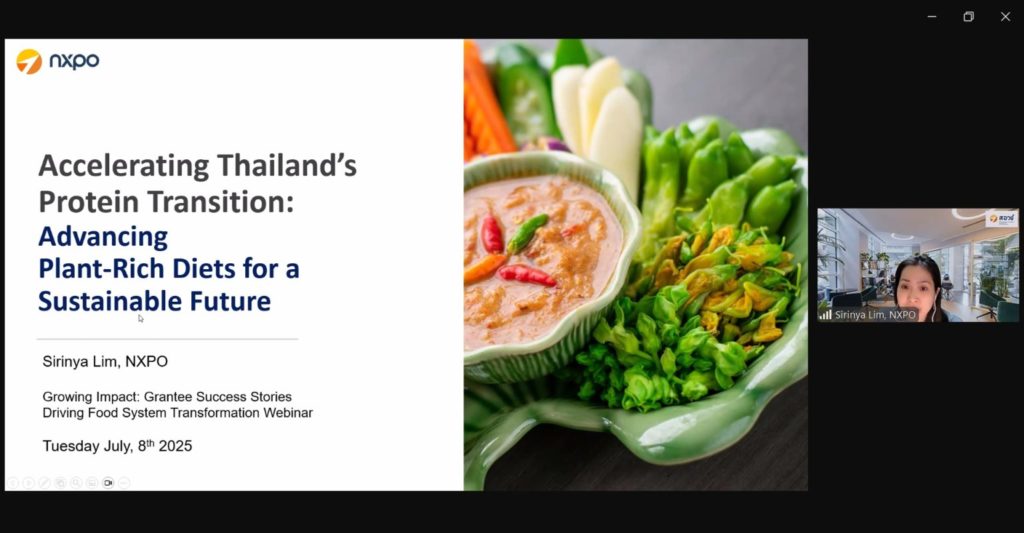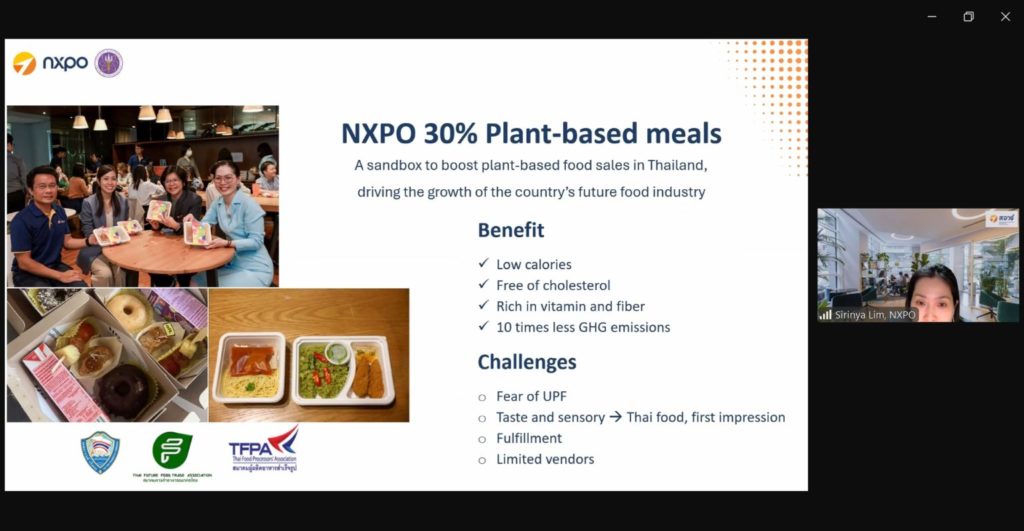On 8 July 2025, Ms. Sirinya Lim, Director of Bioeconomy Policy Division at NXPO, participated in an online seminar titled “Growing Impact: Grantee Success Stories Driving Food System Transformation”, organized by Tilt Collective, an organization promoting food security and sustainability. She joined a breakout session and delivered a presentation on “Accelerating Thailand’s Protein Transition: Advancing Plant-Rich Diets for a Sustainable Future,” highlighting policy directions and the role of public agencies in partnering with the private sector to drive Thailand’s protein transition.

Ms. Sirinya described the current food landscape in Thailand, noting that lifestyle shifts and the rapid rise of restaurant chains in recent years have led to a surge in high-calorie food options and buffet-style eateries. This trend has contributed to rising Body Mass Index (BMI) levels and a growing prevalence of non-communicable diseases (NCDs) nationwide. She emphasized that today’s dietary choices impact not only public health but also the environment and economy.


“Thailand is a leading global exporter of food, particularly protein. We export 900,000 tons of poultry meat annually and allocate over 1 million hectares of land for field corn cultivation. However, this production system faces challenges — from land scarcity to PM2.5 pollution caused by agricultural burning. As both government and industry move toward net-zero greenhouse gas emissions, we need solutions to cut emissions across the food supply chain. Shifting to plant-rich diets offers a solution for building greener supply chains while opening new economic opportunities for the country,” Ms. Sirinya stated.
She pointed to Thailand’s strengths, including a domestic alternative protein market valued at approximately USD 1.34 billion, with an anticipated annual growth of 8%. Most products currently available are soy milk and tofu, while plant-based beverages are also gaining popularity. Thailand also benefits from a rich diversity of plant-based protein sources, with potential to turn native and local crops into modern food products. Furthermore, the country is one of the largest producers of plant-based meat in Asia-Pacific, with an annual production capacity exceeding 3,000 tons.

Ms. Sirinya also highlighted NXPO’s policy to promote plant-based food consumption at its activities and meetings, aiming for 30% of all meals served to be plant-based. The agency has actively raised awareness of plant-based diets’ health and environmental benefits — from lower calories and cholesterol-free options to higher vitamin and fiber content, along with the potential to reduce greenhouse gas emissions by up to tenfold. This initiative not only helps boost Thailand’s plant-based food market but also contributes to the growth of the country’s future food industry. However, challenges remain, including concerns about ultra-processed foods (UPF), taste preferences, and limited food outlets and catering services offering plant-based options.
To support food system transformation, NXPO has developed a strategy: 1) Building a network connecting buyers and suppliers — the initial phase involves gathering data on challenges and working with partners such as the Thai Chamber of Commerce and the Board of Trade of Thailand to facilitate business matchmaking and create a supplier database; 2) Creating a dialogue platform to engage public and private organizations, raising awareness and promoting the benefits of plant-rich diets; and 3) Training ‘Amplifiers’ — individuals positioned to spread knowledge about plant-based food systems, with plans to develop short courses for key groups such as celebrity chefs, food researchers, lecturers, and health entrepreneurs who can extend the message to broader audiences.

NXPO also plans to work with several key partners, including the Sustainable University Network (SUN) Thailand, with 59 member universities, to encourage the installation of vending machines offering plant-based drink options on campuses. In the tourism and wellness sectors, partnerships are planned with the Tourism Authority of Thailand (TAT) to develop a plant-rich restaurant map for destinations, and with the Thailand Convention and Exhibition Bureau (TCEB) to roll out a policy to provide plant-rich foods at conferences and exhibitions. Furthermore, with over 156 national parks, there is potential to integrate plant-rich diets into sustainable tourism initiatives by offering plant-based meals and products at restaurants and shops in park areas.
“Through these initiatives, we aim to build a more diverse, accessible, and healthy food system, while supporting new supply chains and future food markets to reach USD 15 billion. Our goal is to position Thailand as a global hub and supplier of sustainable food and to help the country meet its net zero emissions target by 2065,” Ms. Sirinya concluded.







